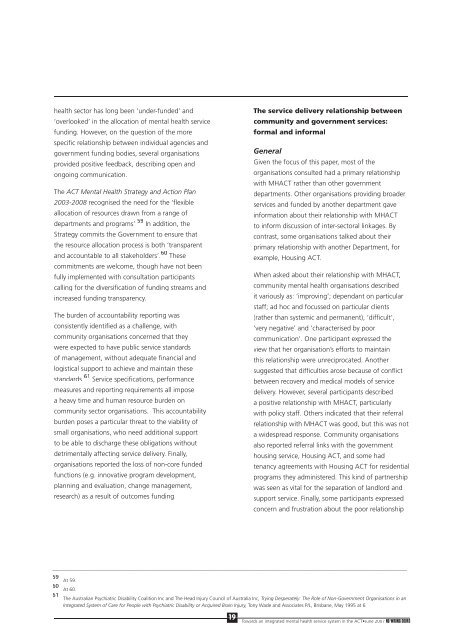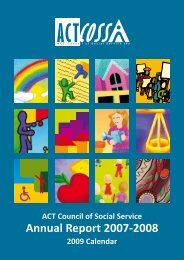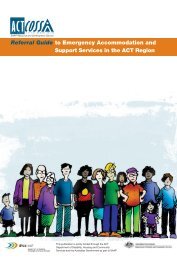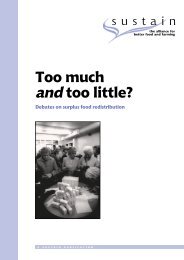actcoss text final.indd - ACT Council of Social Service
actcoss text final.indd - ACT Council of Social Service
actcoss text final.indd - ACT Council of Social Service
You also want an ePaper? Increase the reach of your titles
YUMPU automatically turns print PDFs into web optimized ePapers that Google loves.
health sector has long been ‘under-funded’ and<br />
‘overlooked’ in the allocation <strong>of</strong> mental health service<br />
funding. However, on the question <strong>of</strong> the more<br />
specific relationship between individual agencies and<br />
government funding bodies, several organisations<br />
provided positive feedback, describing open and<br />
ongoing communication.<br />
The <strong>ACT</strong> Mental Health Strategy and Action Plan<br />
2003-2008 recognised the need for the ‘flexible<br />
allocation <strong>of</strong> resources drawn from a range <strong>of</strong><br />
departments and programs’. 59 In addition, the<br />
Strategy commits the Government to ensure that<br />
the resource allocation process is both ‘transparent<br />
and accountable to all stakeholders’. 60 These<br />
commitments are welcome, though have not been<br />
fully implemented with consultation participants<br />
calling for the diversification <strong>of</strong> funding streams and<br />
increased funding transparency.<br />
The burden <strong>of</strong> accountability reporting was<br />
consistently identified as a challenge, with<br />
community organisations concerned that they<br />
were expected to have public service standards<br />
<strong>of</strong> management, without adequate financial and<br />
logistical support to achieve and maintain these<br />
standards. 61 <strong>Service</strong> specifications, performance<br />
measures and reporting requirements all impose<br />
a heavy time and human resource burden on<br />
community sector organisations. This accountability<br />
burden poses a particular threat to the viability <strong>of</strong><br />
small organisations, who need additional support<br />
to be able to discharge these obligations without<br />
detrimentally affecting service delivery. Finally,<br />
organisations reported the loss <strong>of</strong> non-core funded<br />
functions (e.g. innovative program development,<br />
planning and evaluation, change management,<br />
research) as a result <strong>of</strong> outcomes funding.<br />
The service delivery relationship between<br />
community and government services:<br />
formal and informal<br />
General<br />
Given the focus <strong>of</strong> this paper, most <strong>of</strong> the<br />
organisations consulted had a primary relationship<br />
with MH<strong>ACT</strong> rather than other government<br />
departments. Other organisations providing broader<br />
services and funded by another department gave<br />
information about their relationship with MH<strong>ACT</strong><br />
to inform discussion <strong>of</strong> inter-sectoral linkages. By<br />
contrast, some organisations talked about their<br />
primary relationship with another Department, for<br />
example, Housing <strong>ACT</strong>.<br />
When asked about their relationship with MH<strong>ACT</strong>,<br />
community mental health organisations described<br />
it variously as: ‘improving’; dependant on particular<br />
staff; ad hoc and focussed on particular clients<br />
(rather than systemic and permanent), ‘difficult’,<br />
‘very negative’ and ‘characterised by poor<br />
communication’. One participant expressed the<br />
view that her organisation’s efforts to maintain<br />
this relationship were unreciprocated. Another<br />
suggested that difficulties arose because <strong>of</strong> conflict<br />
between recovery and medical models <strong>of</strong> service<br />
delivery. However, several participants described<br />
a positive relationship with MH<strong>ACT</strong>, particularly<br />
with policy staff. Others indicated that their referral<br />
relationship with MH<strong>ACT</strong> was good, but this was not<br />
a widespread response. Community organisations<br />
also reported referral links with the government<br />
housing service, Housing <strong>ACT</strong>, and some had<br />
tenancy agreements with Housing <strong>ACT</strong> for residential<br />
programs they administered. This kind <strong>of</strong> partnership<br />
was seen as vital for the separation <strong>of</strong> landlord and<br />
support service. Finally, some participants expressed<br />
concern and frustration about the poor relationship<br />
___________________________________________________________________________________________________________________________<br />
59 At 59.<br />
60 At 60.<br />
61 The Australian Psychiatric Disability Coalition Inc and The Head Injury <strong>Council</strong> <strong>of</strong> Australia Inc, Trying Desperately: The Role <strong>of</strong> Non-Government Organisations in an<br />
Integrated System <strong>of</strong> Care for People with Psychiatric Disability or Acquired Brain Injury, Tony Wade and Associates P/L, Brisbane, May 1995 at 6.<br />
19 Towards an integrated mental health service system in the <strong>ACT</strong>•June 2007 NO WRONG DOORS













